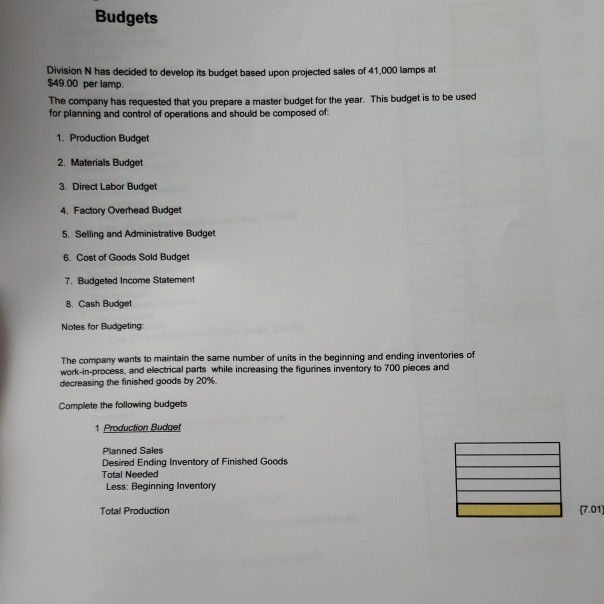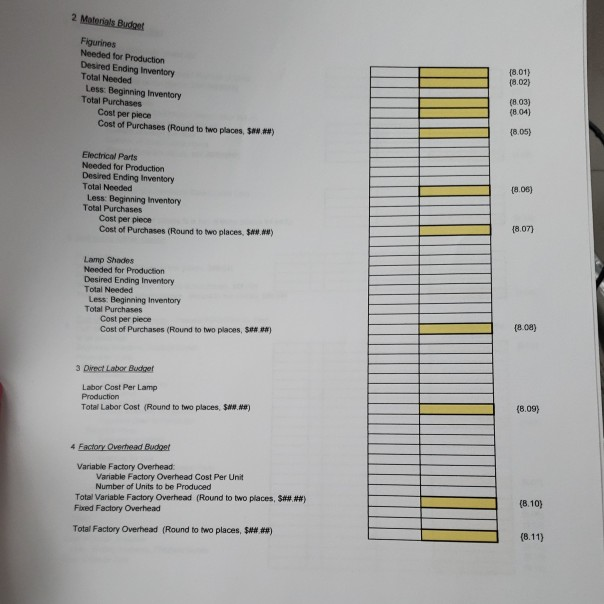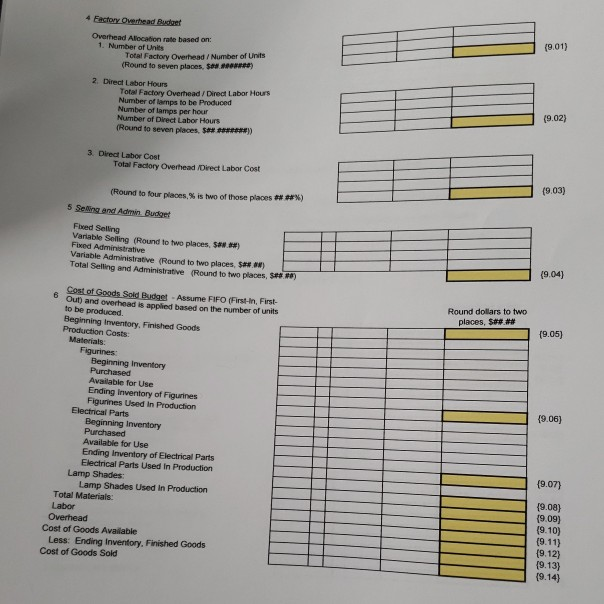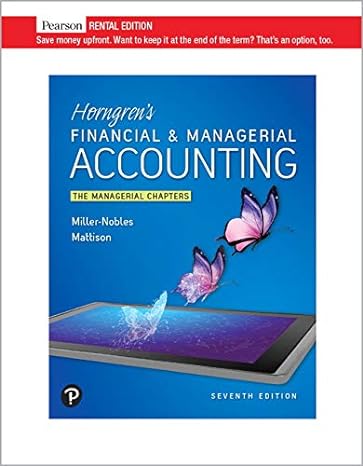Answered step by step
Verified Expert Solution
Question
1 Approved Answer
Budgets Division N has decided to develop its budget based upon projected sales of 41,000 lamps at $49.00 per lamp. The company has requested that



Budgets Division N has decided to develop its budget based upon projected sales of 41,000 lamps at $49.00 per lamp. The company has requested that you prepare a master budget for the year. for planning and control of operations and should be composed of: This budget is to be used 1. Production Budget 2. Materials Budget 3. Direct Labor Budget 4. Factory Overhead Budget 5. Selling and Administrative Budget 6. Cost of Goods Sold Budget 7. Budgeted Income Statement 8. Cash Budget Notes for Budgeting The company wants to maintain the same number of units in the beginning and ending inventories of work-in-process, and electrical parts while increasing the figurines inventory to 700 pieces and decreasing the finished goods by 20%. Complete the following budgets 1 Production Budget Planned Sales Desired Ending Inventory of Finished Goods Total Needed Less: Beginning Inventory Total Production (7.01) Figurines Needed for Production Desired Ending Inventory Total Needed 8.01 (8.02) Less: Beginning Inventory Total Purchases (8.03) (8.04) Cost per piece Cost of Purchases (Round to two places, sa 18.05 ) Electrical Parts Needed for Production Desired Ending Inventory Total Needed Less: Beginning Inventory Total Purchases (8.06) Cost per piece Cost of Purchases (Round to two places." 18.07) Lamp Shades Needed for Production Desired Ending Inventory Total Needed Less: Beginning Inventory Total Purchases (8.08) Cost per piece Cost of Purchases (Round to two places, se# ##) 3 Divect Labor Budget Labor Cost Per Lamp Production Total Labor Cost (Round to two places, s#"#8) (8.09) 4 Eactery Qverhead Bucdee Variable Factory Overhead Variable Factory Overhead Cost Per Unit Number of Units to be Produced Total Variable Factory Overhead (Round to two places, S## ## Fixed Factory Overhead (8.10) Total Factory Overhead (Round to two places, $## ##) 4 Eactory Overhead Budzet (9.01) Overhead Alocation rate based on: 1. Number of Units Total Factory Overhead / Number of Units (Round to seven plaoes, sew seosree) 2. Direct Labor Hours Total Factory Overhead/ Direct Labor Hours Number of lamps to be Produced Number of lamps per hour Number of Direct Labor Hours (9.02) (Round to seven places, st* ####) Total Fadtory Overhead Direct Labor Cost (Round to four places,% is two of those places # #%) 3. Direct Labor Cost (9.03) Fixed Selling Variable Selling (Round to two places. St. #) Fixed Administrative Variable Administrative (Round to two places, ses") Total Selling and Administrative (Round to two places, s# ") (9.04) Cost of Goods Sold Budget Assume FIFO (First-In, First- Out) and overhead is applied based on the number of units to be produced Round dollars to two places, s### (9.05) Beginning Inventory, Finished Goods Production Costs: Materials Figurines Beginning Inventory Purchased Available for Use Ending Inventory of Figurines Figurines Used In Production 9.06) Electrical Parts Beginning Inventory Purchased Available for Use Ending Inventory of Electrical Parts Electrical Parts Used In Production (9.07) Lamp Shades: Lamp Shades Used in Production Total Materials: Labor Overhead 9.08) 9.09) 9.10) Cost of Goods Avaiable (9.12 (9.13) (9.14) Less: Ending Inventory, Finished Goods Cost of Goods Sold Budgets Division N has decided to develop its budget based upon projected sales of 41,000 lamps at $49.00 per lamp. The company has requested that you prepare a master budget for the year. for planning and control of operations and should be composed of: This budget is to be used 1. Production Budget 2. Materials Budget 3. Direct Labor Budget 4. Factory Overhead Budget 5. Selling and Administrative Budget 6. Cost of Goods Sold Budget 7. Budgeted Income Statement 8. Cash Budget Notes for Budgeting The company wants to maintain the same number of units in the beginning and ending inventories of work-in-process, and electrical parts while increasing the figurines inventory to 700 pieces and decreasing the finished goods by 20%. Complete the following budgets 1 Production Budget Planned Sales Desired Ending Inventory of Finished Goods Total Needed Less: Beginning Inventory Total Production (7.01) Figurines Needed for Production Desired Ending Inventory Total Needed 8.01 (8.02) Less: Beginning Inventory Total Purchases (8.03) (8.04) Cost per piece Cost of Purchases (Round to two places, sa 18.05 ) Electrical Parts Needed for Production Desired Ending Inventory Total Needed Less: Beginning Inventory Total Purchases (8.06) Cost per piece Cost of Purchases (Round to two places." 18.07) Lamp Shades Needed for Production Desired Ending Inventory Total Needed Less: Beginning Inventory Total Purchases (8.08) Cost per piece Cost of Purchases (Round to two places, se# ##) 3 Divect Labor Budget Labor Cost Per Lamp Production Total Labor Cost (Round to two places, s#"#8) (8.09) 4 Eactery Qverhead Bucdee Variable Factory Overhead Variable Factory Overhead Cost Per Unit Number of Units to be Produced Total Variable Factory Overhead (Round to two places, S## ## Fixed Factory Overhead (8.10) Total Factory Overhead (Round to two places, $## ##) 4 Eactory Overhead Budzet (9.01) Overhead Alocation rate based on: 1. Number of Units Total Factory Overhead / Number of Units (Round to seven plaoes, sew seosree) 2. Direct Labor Hours Total Factory Overhead/ Direct Labor Hours Number of lamps to be Produced Number of lamps per hour Number of Direct Labor Hours (9.02) (Round to seven places, st* ####) Total Fadtory Overhead Direct Labor Cost (Round to four places,% is two of those places # #%) 3. Direct Labor Cost (9.03) Fixed Selling Variable Selling (Round to two places. St. #) Fixed Administrative Variable Administrative (Round to two places, ses") Total Selling and Administrative (Round to two places, s# ") (9.04) Cost of Goods Sold Budget Assume FIFO (First-In, First- Out) and overhead is applied based on the number of units to be produced Round dollars to two places, s### (9.05) Beginning Inventory, Finished Goods Production Costs: Materials Figurines Beginning Inventory Purchased Available for Use Ending Inventory of Figurines Figurines Used In Production 9.06) Electrical Parts Beginning Inventory Purchased Available for Use Ending Inventory of Electrical Parts Electrical Parts Used In Production (9.07) Lamp Shades: Lamp Shades Used in Production Total Materials: Labor Overhead 9.08) 9.09) 9.10) Cost of Goods Avaiable (9.12 (9.13) (9.14) Less: Ending Inventory, Finished Goods Cost of Goods Sold
Step by Step Solution
There are 3 Steps involved in it
Step: 1

Get Instant Access to Expert-Tailored Solutions
See step-by-step solutions with expert insights and AI powered tools for academic success
Step: 2

Step: 3

Ace Your Homework with AI
Get the answers you need in no time with our AI-driven, step-by-step assistance
Get Started


